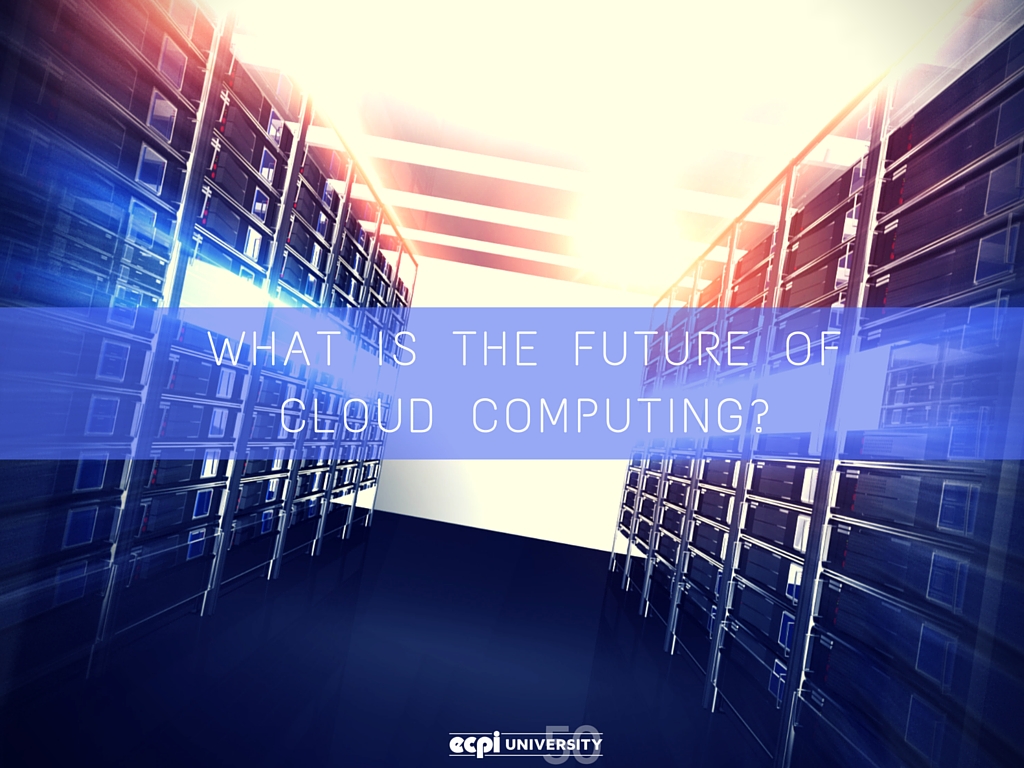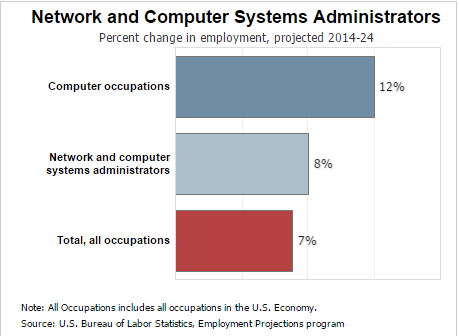What is The Future of Cloud Computing? Let's Take a Look!
No one knows the future, but predictions for cloud computing are sunny. When planning to invest time and money in an education, a careful analysis of trends and forecasts can help guide your decision. Picking the right information technology field, such as cloud computing, can make a huge difference in job satisfaction and earnings.
The Future of Cloud Computing
With cloud computing’s developing track record for reliability, flexibility, and nimbleness, more companies are turning to the cloud for services. They’re also expecting more from the cloud. A recent survey highlighted in Forbes spelled this out clearly. The survey showed that 22 percent of companies moving to hosted services and cloud computing expect to gain improved technology quality on platforms and applications.
More, they look to cloud computing as a way to grow their business (18 percent) and provide better business service and availability (both at 13 percent). Other justifications for moving to cloud computing were to save money and speed the time to market.
The cloud in the near future could be crowded, too: the same survey found that more than a third of companies expected 60 percent or more of their applications will be on the cloud within the next two years.
The Rise of the Hybrid Cloud
Several industry sources predict the rise of the hybrid cloud as the industry standard. A hybrid cloud combines private cloud functions (and on-premises computational power) with public cloud services. The two are linked by touch points or gateways that prevent private information from getting out into the public cloud. Moving data between private and public data centers via Software as a Service (SaaS) applications is a good working definition of a hybrid cloud.
The Wall Street Journal recently reported on a study that showed the hybrid cloud model is taking off, with growth rates of 27 percent through 2019. Most CIOs say the hybrid strategy allows the most flexibility and efficiency. By 2019, the market size for hybrid cloud computing will be nearly $85 billion annually.
Get Your Head in the Cloud!
If you are just beginning to search for your place in information technology (IT), cloud computing could be a great future. Cloud computing encompasses many skills and topics:
- Cloud security
- Computer system administration
- Network engineering
- Computer system architecture
- Application software development
The Bureau of Labor Statistics (BLS) tells us that computer system and network administrators will see eight percent job growth through 2024 and, as of May, 2015, a median annual wage of $77,810 .
Cloud Cover
With a strong education in cloud computing from a leading university, you can go anywhere in the country and enjoy the chance for a solid, entry-level job at the leading edge of IT innovation. Cloud computing covers the worlds of business, government and education, from apps designed exclusively for cloud usage, to changes in compliance standards that allow cloud-based government services, to new levels of secure cloud storage.
Working in cloud computing begins with a solid education, but can take you anywhere. California, for example, leads the nation in employment, says the BLS, of computer system and network administrator, but also is among the top five for median annual income, at $92,020 as of May, 2015. Leading the country is Maryland, with a median annual income of $100,620.
Cloud Containers
One noteworthy expectation among cloud architecture experts is the increase in containers. The information technology research and advisory company Gartner says the era of linear application designs is over, yielding to microservice architecture for building cloud-distributed applications.
Containers are replacing the virtual machines (VMs) by providing isolated spaces for cloud-based applications to each have their own sysadmins and user groups. These containers can be stacked at a much smaller footprint than the VMs they replace in the host operating system.
Opportunities and questions remain with any new, agile technology. Docker may be the default container provider, but getting it to work in hybrid environments—also noted as one of the future paths of cloud computing—is "not easy," says Logicworks. In that complexity, of course, lies opportunity for the well-educated IT professional.
Here are seven ways #cloudcomputing is shaking up the #ITindustry and what it all means. via @ECPIUniversity http://t.co/PiiD6lLEkk
— Mark O'Hare (@SecurityFirstCo) September 15, 2015
Cloud Computing at ECPI University
ECPI University’s Bachelor of Science in Computer and Information Science with a concentration in Cloud Computing could provide you with the tools you need to reach the future of cloud computing. In as little as 2.5 years, you could earn a degree with a concentration in Cloud Computing. Launch your career in any number of IT capacities:
- Network and Datacenter Administrator
- Network Implementation Team
- Network Infrastructure Support
- Network Support and Help Desks
- Storage Technology Manager
- Virtual Server Administrator
If you could see some of the sunniest days of your working life with a solid career in cloud computing, get started on your future by contacting ECPI University today. It could be the Best Decision You Ever Make!
DISCLAIMER – ECPI University makes no claim, warranty, or guarantee as to actual employability or earning potential to current, past or future students or graduates of any educational program we offer. The ECPI University website is published for informational purposes only. Every effort is made to ensure the accuracy of information contained on the ECPI.edu domain; however, no warranty of accuracy is made. No contractual rights, either expressed or implied, are created by its content.
Gainful Employment Information – Cloud Computing - Bachelor’s
For more information about ECPI University or any of our programs click here: http://www.ecpi.edu/ or http://ow.ly/Ca1ya.




